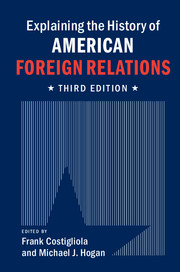Book contents
- Frontmatter
- Dedication
- Contents
- List of figures
- List of contributors
- Introduction
- 1 Theories of International Relations
- 2 National security
- 3 Corporatism: from the new era to the age of development
- 4 Explaining political economy
- 5 Diplomatic history after the big bang: using computational methods to explore the infinite archive
- 6 Development and technopolitics
- 7 Nonstate actors
- 8 Legal history as foreign relations history
- 9 Domestic politics
- 10 The global frontier: comparative history and the frontier-borderlands approach
- 11 Considering borders
- 12 The privilege of acting upon others: the middle eastern exception to anti-exceptionalist histories of the US and the world
- 13 Nationalism as an umbrella ideology
- 14 Nation Branding
- 15 Shades of sovereignty: racialized power, the United States and the world
- 16 Gendering American foreign relations
- 17 The religious turn in diplomatic history
- 18 Memory and the study of US foreign relations
- 19 The senses
- 20 Psychology
- 21 Reading for emotion
- Index
7 - Nonstate actors
Published online by Cambridge University Press: 05 March 2016
- Frontmatter
- Dedication
- Contents
- List of figures
- List of contributors
- Introduction
- 1 Theories of International Relations
- 2 National security
- 3 Corporatism: from the new era to the age of development
- 4 Explaining political economy
- 5 Diplomatic history after the big bang: using computational methods to explore the infinite archive
- 6 Development and technopolitics
- 7 Nonstate actors
- 8 Legal history as foreign relations history
- 9 Domestic politics
- 10 The global frontier: comparative history and the frontier-borderlands approach
- 11 Considering borders
- 12 The privilege of acting upon others: the middle eastern exception to anti-exceptionalist histories of the US and the world
- 13 Nationalism as an umbrella ideology
- 14 Nation Branding
- 15 Shades of sovereignty: racialized power, the United States and the world
- 16 Gendering American foreign relations
- 17 The religious turn in diplomatic history
- 18 Memory and the study of US foreign relations
- 19 The senses
- 20 Psychology
- 21 Reading for emotion
- Index
Summary
“Shortly after I left office,” former president Bill Clinton told a group in 2005, “I was shaving and I looked in the mirror and I thought, my God, I have become an NGO.” The remark neatly captures the ubiquity of NGOs in today's world. Previous ex-presidents had taken up various causes, as Clinton did with HIV/AIDS, but in recent decades activities that might earlier have fallen under other rubrics have been swept up in an NGO revolution. The three-letter designation is now so common that it has congealed into a distinct word, independent of its origins as an acronym for nongovernmental organization. Along with other nonstate actors, NGOs have exploded in numbers and in power and influence. As the terrain of global politics has been reconfigured, a booming scholarship in political science, sociology, and anthropology has arisen, which aims to explain how these newly assertive actors influence national and international politics and local lives. In international history, nonstate actors that once hovered on the periphery are moving to the center of scholarly attention.
Rising interest in the role of nonstate actors in international relations is part of a broader shift in the field away from scholarly preoccupation with state-to-state relations. As summed up by two critics in 1971, students and practitioners of international politics traditionally cared almost exclusively about relationships among states. In this view, “the state, regarded as an actor with purposes and power, is the basic unit of action: its main agents are the diplomat and the soldier.” The state-driven models of international relations this description captures have been under challenge at least since the 1970s, as it has become glaringly apparent that state power is but one of the drivers of global affairs. Nonstate actors have at their disposal economic or moral assets that translate into direct and indirect political power; some nonstate actors, such as the Palestine Liberation Organization, have military capabilities. As international relations have been transformed, the study of international relations has shifted to adapt to new realities.
The novelty of the scholarly shift and the innovations nonstate actors are bringing to global affairs can easily be overstated. After all, the British East India Company ran a subcontinent in the seventeenth and eighteenth centuries. People have always moved about the world. Networks of traders, religious proselytizers, artists, and intellectuals spread ideas, practices, and goods across political boundaries.
- Type
- Chapter
- Information
- Explaining the History of American Foreign Relations , pp. 119 - 134Publisher: Cambridge University PressPrint publication year: 2016



